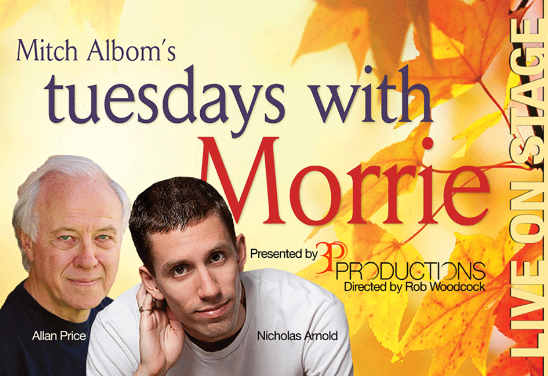Review: 3P Productions' "tuesdays with Morrie" at the Capital Theatre
David Rabjohn, Associate Toronto Critic
Sports columnists tend to be a hard scrabble lot – chomping cigars and wearing fedoras. A stereotype perhaps, but many of these writers have long careers as successful sports writers and many branch into other arenas of writing. Damon Runyon moving to Broadway or Ralph Wiley moving from the sports booth to politics. Their writing skills are honed and fired in the kilns of unrelenting deadlines and the need to pen history in its immediacy. Mitch Albom is in this second group – a celebrated sports columnist from Detroit, he moved into novel writing which moved into theatre. His play, tuesdays with Morrie, opened this week at Port Hope, Ontario’s Capitol Theatre.
Albom’s autobiographical novel, now turned play, is the story of a lifelong friendship between him and his former professor and mentor Morrie Shwartz. Toward the end of Morrie’s life, the relationship gains intensity as he is racked with the sufferings of ALS ( Lou Gehrig’s disease.) Albom falls into a Tuesday ritual as he visits his friend in distress and discovers life (and death) lessons that could not have been learned anywhere else. Patience, perspective, loyalty and the need to balance work and life are some of the resultant themes.
This two man piece requires heavy lifting from the two actors. Like boxers or figure skaters, they are out there on their own with an audience focused on them alone. Allan Price (Morrie Schwartz) and Nicholas Arnold (Mitch Albom) do a fine job of portraying this relationship of humour, sadness, awakening, and acute emotion. At the beginning, Mr. Arnold immediately displays his musical skills on the piano which sets up the disappointment of his later loss of musical passion. Mr. Price equally begins with some comic dancing that foreshadows his character’s delight in humour. Price’s Yiddish accent seems awkward and inconsistent at first – as the play moves along it settles into a warmer consistent lilt. Arnold, as well, seems stiff at first, but relaxes into the part moving on.
Other highlights of Arnold’s performance include a delightful rendition of Lou Gehrig’s famous parting speech (you knew it had to come.) Impressive physicality on stage is the result of the character’s aversion to physical contact. He had to deftly learn to manipulate Morrie in his wheelchair to provide comfort. At first unwilling to even offer the usual kiss on the forehead, he ends up in a powerful scene, nimbly directed by Rob Woodcock. With lowered lights, Mitch clinically picks up Morrie in a full body press to move him from wheelchair to hospital bed. His fear of physical connection is broken. Price, as Morrie, has lost much of his muscular ability so he reaches for other methods of communication towards both Mitch and the audience. His crafty humour is seen in his face that lights up and turns down with the dialogue. Near the end, not much else can move, but his eyes blaze. They turn right and left with pronouncement which gives his lethargic body some sense of his old dancing days.
Some of the writing falls flat. Some moments seemed repetitious and other moments suffer from an onslaught of sentiment. The story, of course, is emotional, but the tenderness needed some balance or it becomes overbearing. Mitch’s anger with himself seemed too self-serving. His reluctance to “share” Morrie had no preamble. Some of this was balanced by moments of humour, but even some of that fell flat such as efforts at toileting challenge jokes. Some of the storyline was predictable, but a fresh moment of surprise and stagecraft came in the form of Mitch’s invisible wife. Meant to be real or not, it was delightful to witness the actors engage with a phantom character. Mitch’s anxiety and Morrie’s joy at the meeting elevated the scene.
The set, by Pascal Labillois, was functional as a professorial home and office in New England. It was not intended to be elaborate as Morrie lives a quiet, academic life. Plain white plastic jugs carrying liquids, both agreeable and disagreeable, provide some humour and set the tone. Lighting by John Dalgleish subtly highlighted the overarching maple tree that sometimes became a focus for the characters. A brooding moment was set with shadowy light that hauntingly darkened Mitch’s eyes during one of his soliloquys.
Beyond some of the stilted dialogue, this is an emotional evening demanding our attention reflecting on the issues of life and the inevitability of death. Come and see tuesdays with Morrie for some humour and some introspection. It is playing most nights – including Tuesdays!
tuesdays with Morrie by Mitch Albom and Jeffrey Hatcher – Capitol Theatre – Port Hope, Ontario.
Cast: Allan Price, Nicholas Arnold.
Production staff: Rob Woodcock – director
Costume Designer – Alex Amini
Set Designer – Pascal Labillois
Lighting designer – John Dalgleish
Sound engineer – Lance Jeffrey
